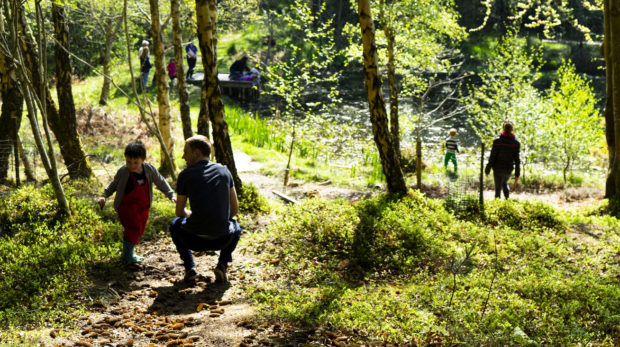Would you raise an eyebrow if a man started working in your child’s nursery? Would you chat about it round the dinner table? Or perhaps even share a few seemingly harmless jokes with friends?
Fuelled by our unconscious bias – judgements we make without even noticing – it’s a stereotype many of us fall foul of when we think about early learning and childcare as a career choice.
“People don’t see it as a man’s job,” is a common response when we ask young people what they think about men in childcare roles.
Even now, it’s still uncommon to find a man working in an early year and childcare setting. Currently only 4% of the workforce in Scotland is male. Men interested in childcare cite common barriers and, while pay is a factor, it’s often down to the stigma they face working with children. But perceptions are changing, slowly. As one male childcare student put it: “For every person that stereotypes you or makes a negative comment, there’s another person desperate to support you.”
The childcare sector is facing significant changes. We’ve seen a push from within the industry to raise the quality of learning and staff are taking the lead in raising aspirations through upskilling and the desire to develop a deeper knowledge, understanding and professional competence. Coupled with that, the Scottish Government’s expansion of funded childcare hours from next year has brought its own challenges. Yet, gender bias in the sector remains at the top of the agenda and last October the government announced a £50,000 fund to address the issue in Scotland.
Through this fund, the University of the Highlands and Islands, led by Inverness College UHI, piloted a fast-track men in childcare programme earlier this year. The free course was delivered at the same level as a Higher and run in the early evening to allow men who were already in employment to re-train. Students explored a range of topics, including the development of children and young people and the benefits of play and its links to learning. They also learned about the influences and circumstances which may have an impact on the well being of children and young people, the physical and emotional risks at different stages of a child’s development and the role of adults such as parents, play workers and teachers.
With an initial target of recruiting five students, this was quickly surpassed with 12 men enrolling on the 11-week programme, attracting everyone from school leavers to career changers. One student found the all-male study approach so supportive he travelled a round trip of 100 miles once a week to participate in classes face to face.
The students who completed the programme are all progressing on to further study with the aim of working as early year and childcare practitioners. Coincidentally, they’ll be learning alongside the college’s first male lecturer in early years, who brings significant experience in delivering outdoor learning to children and will lead on the full-time programmes’ forest kindergarten units. Inverness College UHI is also looking into plans for an Erasmus-funded exchange programme with countries in Scandinavia, where the number of male childcare workers is significantly higher. This would be available to a broad range of childcare practice students.
The students have become ambassadors for the programme and for the drive to encourage more men to consider this fun and rewarding career. As another student described: “It’s the balance between challenge and reward. You are a role model and have a key role to play in their development – from showing them how to respect others, to encouraging their confidence and helping them overcome barriers. We need to move away from the idea it’s just like babysitting, the career deserves so much more respect.”
Interestingly, the men in childcare programme confirmed research which indicates the importance of male and female role models in early years, with men bringing different skills and approaches to learning which is important for a child’s development. In particular, the programme provided staff with unexpected areas of reflection, particularly around how comfortable the male group created good ‘flow of play’ and how quickly and without debate they allowed play opportunities to move in less unexpected directions.
While the aim of the programme was to tackle gender stereotypes and redress the imbalance in early years, perhaps more importantly, it highlights the importance of diversity in early years. At a key development stage, when children are learning fast, different approaches to play and learning are critical. By encouraging this and tackling gender bias at a young age, we can begin to ‘normalise’ men in childcare, tackle the unconscious bias that exists and move away from the raised eyebrows.
Heather Keyes is head of care, health and wellbeing, Inverness College UHI
